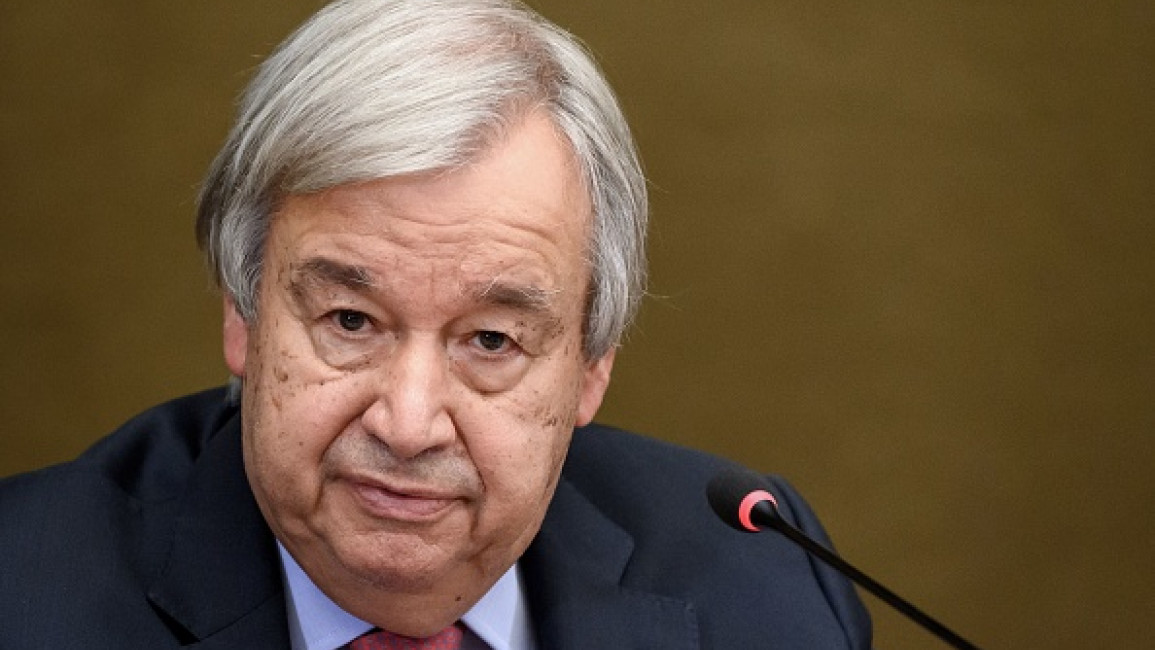UN chief Antonio Guterres pleads for 'lifeline' for Afghanistan and urges international engagement with the Taliban
UN chief Antonio Guterres on Monday urged the international community to engage with the Taliban and to provide a "lifeline" of desperately needed aid to Afghans, as the first foreign commercial flight left Kabul - a hopeful sign for those still trying to leave the country.
Guterres was in Geneva to host a donor conference aimed at raising hundreds of millions of dollars for the violence-torn country, which was taken over by the Taliban last month in a lightning offensive that took retreating US troops by surprise.
In all, UN humanitarian chief Martin Griffiths said donor countries pledged a total of $1.2 billion in aid, but did not say how much had been earmarked for the UN's flash appeal for $600 million to fund emergency assistance for the rest of this year.
The flash appeal was launched amid fears that malnutrition is looming for many, and perhaps even starvation, with mass displacement in the country and winter fast approaching.
Guterres said he believed aid could be used as leverage with the Islamist extremists to exact improvements on human rights, amid fears of a return to the brutal rule that characterised the first Taliban regime from 1996 to 2001.
"It is impossible to provide humanitarian assistance inside Afghanistan without engaging with the de facto authorities," the UN secretary-general told ministers attending the Geneva talks.
"It is very important to engage with the Taliban at the present moment."
Guterres urged nations to "find ways to allow for an injection of cash in the Afghan economy" in order to avert an outright collapse that would have "devastating consequences" for Afghanistan and the wider region.
"I don't think that if the de facto authorities of a country misbehave, the solution is to do a collective punishment to their people," he said.
The Taliban have promised a milder form of rule this time around, but have moved swiftly to crush dissent, including firing in the air to disperse recent protests by women calling for the right to education and work.
UN rights chief Michelle Bachelet said she was "dismayed by the lack of inclusivity of the so-called caretaker cabinet, which includes no women and few non-Pashtuns".
She added there was "well-founded" information showing the Taliban had gone against their commitment to a more moderate brand of government, pointing in particular to "credible allegations of reprisal killings" of former Afghan security forces.
With the situation in Kabul far from settled, the departure of the first international commercial flight since the Taliban takeover offered Afghans still wanting to flee a glimmer of hope.
A Pakistan International Airlines jet landed in Kabul Monday before making a return flight to Islamabad with about 70 people on board -- mostly Afghans who were relatives of staffers with international organisations, according to airport ground staff.
"I am being evacuated. My final destination is Tajikistan," said a 35-year-old World Bank evacuee, who did not want to give her name.
"I will come back here only if the situation allows women to work and move freely."
Kabul's international airport was trashed after US-led forces finished a chaotic evacuation of more than 120,000 people, and the Taliban have since scrambled to resume operations with technical assistance from Qatar and other nations.
Qatar Airways operated several charter flights out of Kabul last week, carrying mostly foreigners and Afghans who missed out on the evacuation.
An Afghan airline resumed domestic services on September 3.
But the resumption of commercial flights will be a key test for the Taliban, who have repeatedly promised to allow Afghans with the right documents to leave the country freely.
"It's a hopeful day. Maybe other airlines will see this and decide to come back," said one airport employee.
A PIA spokesman it was too soon to say how frequently flights between Kabul and Islamabad would operate.
Many NATO nations admitted that they had run out of time to evacuate thousands of at-risk Afghans before the US withdrawal deadline, and some Afghans who helped foreign powers during the 20-year US-led occupation fear they will be targeted.
But the Taliban insist they have granted a general amnesty to everyone -- including the security forces they fought against.
Also on Monday, Taliban co-founder and now deputy prime minister Abdul Ghani Baradar released an audio statement saying he was alive and well after news of his supposed demise went viral on social media.
And in Washington, US Secretary of State Antony Blinken, testifying before irate lawmakers, once again defended America's withdrawal from Afghanistan, insisting the administration of President Joe Biden was prepared for worst-case scenarios.
"There's no evidence that staying longer would have made the Afghan security forces or the Afghan government any more resilient or self-sustaining," Blinken said.
"If 20 years and hundreds of billions of dollars in support, equipment and training did not suffice, why would another year, another five, another 10?"


![President Pezeshkian has denounced Israel's attacks on Lebanon [Getty]](/sites/default/files/styles/image_684x385/public/2173482924.jpeg?h=a5f2f23a&itok=q3evVtko)





